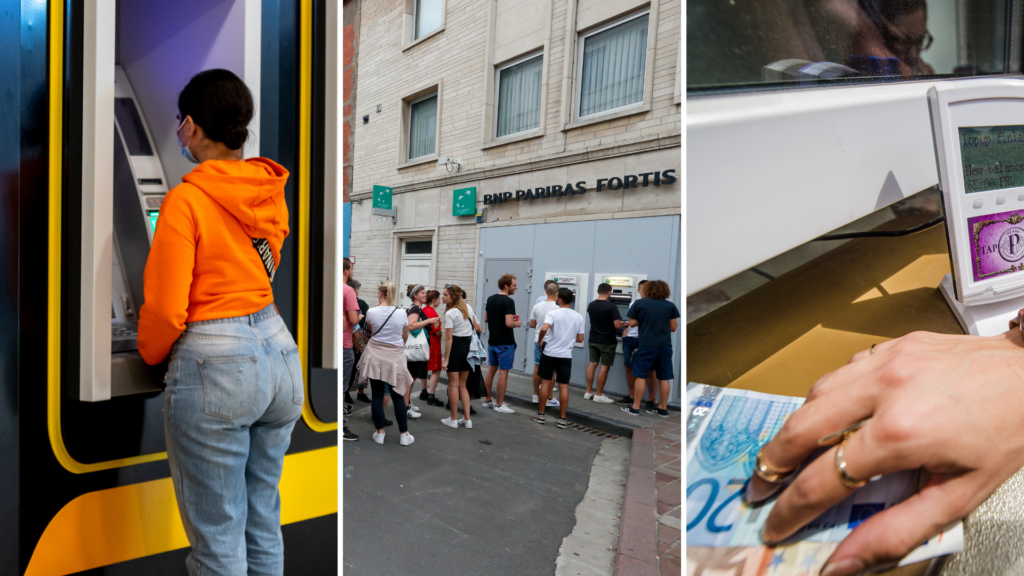The benefits of a cashless society are constantly promoted by financial institutions and regulators, for whom a centralised register of digital transactions represents a major tool against money laundering.
In addition, the public is sold the promise of seamless payments at the tap of a card or phone – far more convenient than fumbling for loose change and safer than carrying wads of banknotes around. For anyone on the fence about doing away with hard cash as the common currency, all merchants in Belgium have been legally obliged to accept digital payment since July 2022.
But the belief that "cash is king" is hard to shake and despite encouragement and legal persuasion, many just aren't ready to swap the clink of coins for cards embedded with microchips. Whether the reluctance is on the part of consumers or traders, one often finds in Belgium that attempts to pay with card are turned down or come with an additional charge for some associated cost (how much this is is not clear).
Yet the whole payment palaver is made downright annoying as access to our savings grows increasingly difficult. With the number of ATMs/cashpoints falling each year, withdrawing our money frequently comes with a trek just to find that the machine is either broken, out of cash, or has been discontinued.
How often have you given up on buying something because you were put off the exercise of paying for it? The value of missed purchases nationwide is surely considerable. Worse still, many municipalities in Belgium no longer have a cashpoint at all, stoking fears of a social gap between those who are digitally competent and those who struggle to access online banking – particularly those without the apparatus (smartphones or computers) to participate.
Compounding the issue is the fact that Belgium's four major banks have failed to deliver on plans to install more co-operated ATMs whilst at the same time removing those that they operate independently. Citizens organisations have highlighted the problem this presents and stress the need for a universal banking service.
Until then, Belgium's transition to cashless feels more forced than voluntary. Is paying in Belgium unnecessarily complicated? Let @Orlando_tbt know.
Belgium in Brief is a free daily roundup of the top stories to get you through your coffee break conversations. To receive it straight to your inbox every day, sign up below:
1. Withdrawing cash: Even fewer ATMs in Belgium as banks fall short of promises
Despite longstanding complaints from citizens about the difficulty of withdrawing cash in Belgium, and assurances from the Federal Government that more ATMs (cash points) will be installed nationwide, banks across the country are still reducing the number withdrawal points. Read more.
2. Extend nuclear reactors to keep electricity costs low, Belgian industry urges
The cost of energy is a concern for all Belgians, not only citizens but companies as well. Already vocal about rising employment costs brought on by Belgium's automatic indexation, industry representatives are now calling to ensure the country's nuclear reactors keep running in order to guard against rampant rises in electricity costs. Read more.
3. Zelensky in Brussels, Belgium agrees to send combat aircraft to Ukraine
Belgium will indeed be sending combat aircraft to Ukraine by 2025, announced Defence Minister Ludivine Dedonder (PS) on Wednesday morning in an interview with Bel RTL. Read more.
4. Bedbug hysteria: Cases up by 30% in Belgium as SNCB remains 'vigilant'
With reports of bedbugs on the rise across Europe, and treatments of cases up by a third in Belgium compared to last year, the national railway company is being extra vigilant and increasing cleaning measures on its trains. Read more.
5. Israel - Gaza war risks escalating to multi-front war
The casualties on both sides following the surprise attack of Hamas on Saturday morning against southern Israel have increased dramatically since the full scale of its massacres of Israeli civilians have been known. Read more.
6. Renovation of Place Royale begins to become a partial pedestrian zone
The emblematic Place Royale in the heart of Brussels is to be redeveloped as a partial pedestrian zone. The work was officially launched on Wednesday morning with a symbolic ceremony. Read more.
7. The Italians who dug Belgium’s black gold
Italians flooded into Belgium after the Second World War to work in the coal mines. It was a dirty job, and the newly arrived immigrants often faced hostility from the locals. It was also dangerous: the 1956 Bois du Cazier mine disaster in Marcinelle claimed 262 lives, mostly Italian. Read more.


